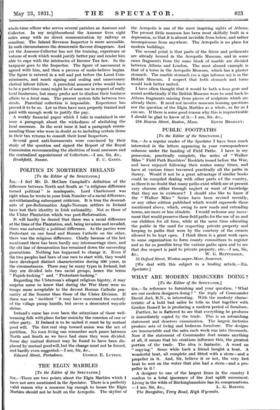POLITICS IN NORTHERN IRELAND
[To the Editor of the SPECTATOR.]
feel Mr. D. McClure Campbell's definition of the difference between North and South as "a religious difference turned political" is inadequate. Lord Charlemont was right when he wrote in your Irish Number of a racial difference, notwithstanding subsequent criticism. It is true the descend- ants of pre-Reformation Anglo-Norman settlers in Ireland have lost their identity in Irish nationality. Not so those of the Ulster Plantation which was post-Reformation.
It will hardly be denied that there was a racial difference at the time of the Plantation, and, being invaders and invaded, there was naturally a political difference. As the parties were Protestant on one hand and Roman Catholic on the other, there was the religious difference. Chiefly because of the last mentioned there has been hardly any intermarriage since, and the old line of demarcation has remained down the succeeding generations. Nothing has happened to change it. Even if the two peoples had been of one race to start with, they would have developed distinct characteristics during 300 years, in the circumstances. There may be many types in Ireland, but they are divided into two racial groups, hence the terms " Papish-looking " and - " Protestant-looking."
Regarding the Ulsterman's alleged religious bigotry, it may surprise some to know that during the War there were no troops more acceptable to the devout Roman Catholic pea- santry of the Somme than those of the Ulster Division. If there was an "incident " it may have concerned the custody of the village pump handle, but never a desecrated wayside shrine.
Ireland's curse has ever been the attentions of those well- meaning folk withplans for her unionby the coercion of one or other party. If Ireland is to be united it must be by mutual good will. The first real step toward union was the act of partition. No man living can remember such peace between North and South as we have had since they were divided. Some day mutual distrust may be found to have been dis- placed by mutual good will, but the change must not be forced, and hardly even suggested.—I am, Sir, &c.,






































 Previous page
Previous page